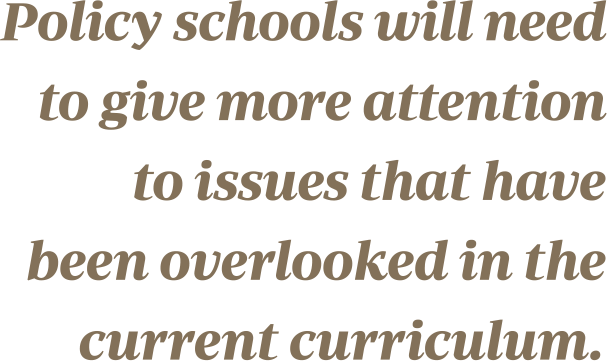This multi-disciplinary approach is especially appropriate as policy schools increasingly recognize that policy is not just the province of national governments or international organizations, but engages the private sector, nonprofits, and social enterprise as well. The most innovative policy schools no longer see themselves as schools of “government,” just as the most innovative international affairs schools no longer define themselves as arenas for training diplomats. Courses on philanthropy, international financial institutions, and social entrepreneurship play a role, as students now expect to address challenges at all levels of society—from their local communities and states to Washington and the world beyond.
In turn, we live in an era of growing financial constraints on government. Policy schools are seeing a strong interest in programs that evaluate new techniques for predicting the cost-effectiveness of alternative policy options. Recently, these techniques have grown to include statistical analyses using large data sets (“big data”) and controlled experiments with promising policy initiatives. Jeanine Braithwaite, for example, joined Batten after more than 30 years at the World Bank and International Monetary Fund. The senior lecturer in public policy teaches a weekly seminar on “Household Data Analysis,” which gives students the tools to analyze one form of big data about households and individuals from a Household Budget Survey (HBS) from Turkey. In her own research, she examines social protection, labor, and poverty reduction through similar datasets. Other leading researchers on the Batten faculty exemplify this trend in their work.
Yet while policy schools have changed significantly since their formative years, they will need to continue to evolve. While reducing big policy problems to smaller, researchable questions will continue to lead to valuable insights, schools will also need to take a more comprehensive, holistic look at major societal and transnational problems. Failure to do so is one reason why well-intentioned policy interventions often produce unintended consequences. Schools will gain from more fully exploring the intersection of policy analysis and systems analysis, since both the problems and solutions in today’s policy landscape involve large, complex systems with many interrelated elements.
UNCONVENTIONAL COURSES
The Batten curriculum teaches not just how to analyze, but How to lead.
- Psychology for Leadership
- Congress 101: Leadership Strategies
- Leading and Managing Diverse Groups
- Budgetary Process Politics
- Advanced Development Policy
- Values-Based Leadership
- Global Leadership
This more holistic approach may also help us address another issue. In designing public policy, analysts need to examine not just the effectiveness of individual policies, but the cumulative impact of new laws and regulations, and the creation of new agencies to implement them. Over time, this accretion has created what some call a “kludgeocracy.” [2] This can result in both ineffective policy and a “dead weight loss” for society. In the formulation of policies, therefore, design thinking—with its focus on simplicity as well as functionality—may be a useful complement to traditional economic analysis.
In addition to taking up new issues being created by demographic change, technological innovation, and growing inequality, policy schools will also need to give more attention to issues that have been overlooked in the current curriculum. This is particularly true of macro-economic policy, financial regulation, and the promotion of economic competitiveness—all of which are important in a competitive global economy. Another neglected issue is the design and functioning of political institutions. Often referred to as “governance,” this has not traditionally been a focus of policy schools. Yet it is an important problem in many rapidly evolving societies—including the hyper-polarized United States, where government institutions are now held in very low repute.
Finally, policy schools will succeed in the 21st century by globalizing their curricula. This means not only introducing American students to global issues, as is widely taking place, but also showing international students how to apply comparative policy-analysis techniques in the wide range of contexts in which they’ll be working. The focus of much of the policy analysis literature remains centered on the United States, when, in fact, more and more analysis is being done outside America. By analyzing policies and institutions using a more global approach, both our international and American students will benefit.
The Batten School has been in the lead of many of these changes in policy teaching and research. Looking ahead, Batten will continue to be at the forefront of change, not just following best practices, but helping reinvent the public-policy degree for the challenges ahead, in a way others may come to emulate. As we do so, we will produce a new generation of leaders who will change their communities, change their countries and even change the world.
